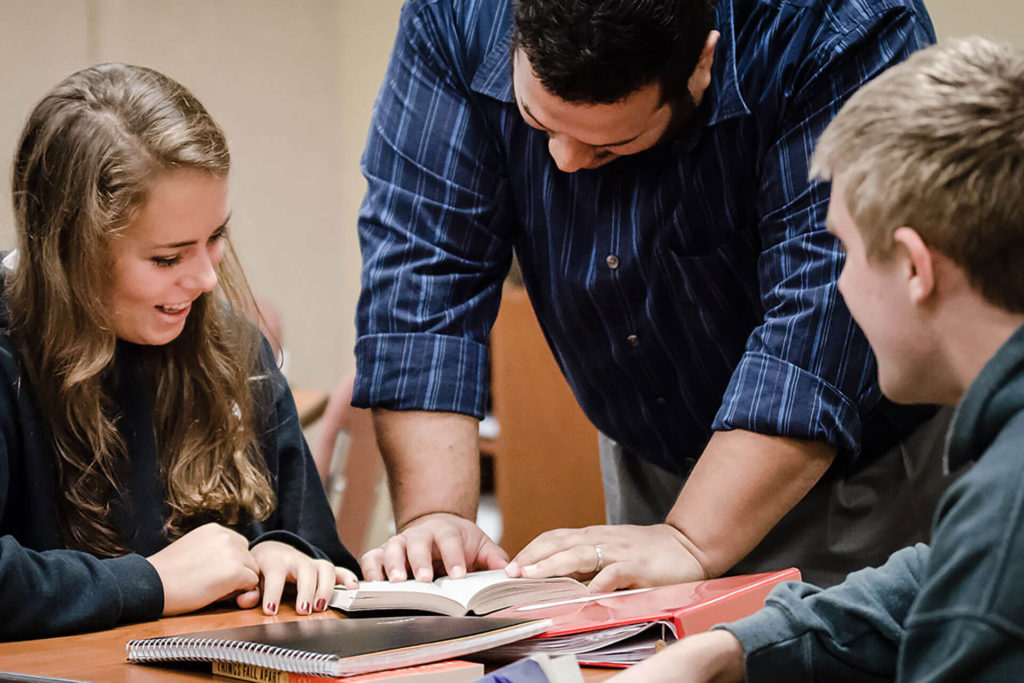Academics
Docentes Coram Deo—Teachers Before the Face of God
What does it mean
to educate?
Beginning with the end in mind, to educate is to train the whole person to discern truth. At Cherokee Christian Schools, we move our students through three distinct phases of their education with this goal firmly fixed before us. These goals do not neatly end in one year and begin in another, and each person develops differently, but they serve as broad categories and help direct our team to know how to teach and how to measure growth effectively.
Preparation:
Emphasis in the early years is placed on drill, repetition, and practice. While schools are often tempted to skip to more “advanced” models, history teaches us that memory is one of the foundational abilities for a learner. This stage prepares students by instilling core facts and skills deep in the memory. Phonics, math drills, cursive handwriting, and Bible building blocks are combined with an active learning environment designed to promote character development. This stage answers the question, “What is Virtue?”
Practice:
At the onset of adolescence, students become more self-aware. Building on what they’ve learned conceptually, this season entails practice of studious habits and virtuous conduct. Critical development is often ceded to children when, at this age, they are permitted to become self-defining. By directing students back to virtue, we re-affirm that the only image that matters is the one in which they were created. The “why” questions which emerge at this stage require skillful direction from teachers. Students in this stage must practice finding truth, either in God’s word or His world, rather than allowing themselves to become the measure of it. This stage answers the question, “How do I practice Virtue?”
Purpose:
Purpose is the most important characteristic of the final stages of education. While most are tempted to skip to this point in their instruction, the earlier stages need to lay out a Biblical order that explains where the student is in the world, and how he’ll move forward. Students are called to engage in more reflection at this stage as they explore the reasons behind their own thoughts and actions, as well as those of others. Emphasis is placed on analyzing material and learning to evaluate it. Through these two processes, discernment is formed by having the student explain the how’s and whys of what makes something good or evil. This stage answers the question, “What is the purpose of Virtue?”
The high calling of
Christian education…
Scripture indicates that the sign of a finished product is that the student becomes like the teacher (Luke 6:40). While this doesn’t primarily refer to things like taste in clothing or how we take our coffee, we believe the fundamental unit of education is the relationship between teacher and student. It is here the student learns, both implicitly and explicitly, the ordering of loves. The high calling of Christian education involves modeling love for the student and class, love for the subject, love of learning, and love of the Lord.
Love is cheapened when reduced to sentiment rather than infused with purpose. Furthermore, loves can conflict with one another and even disrupt the integrity of a person’s life. Teachers enter their classrooms every day knowing that in addition to contending with any number of outside forces, they’ll also be forced to account for what is good, better, and best in each situation. Modeling this for students calls for greater transparency and awareness.
While we love to see applicants possess excellent credentials and impressive resumes, the most important criterion for our faculty is their commitment to this process. By modeling both the discernment required to order learning, and joy while facing trials, we believe the impact of a teacher is guaranteed at the most fundamental levels of personhood. After all, what more are we asking students to do then order their own minds to learn and face down their tests with joy?
We unapologetically stand in the Reformed Protestant tradition which believes in developing wisdom and discernment above all. This idea was so important that it led many of our forefathers to found Universities, places where the “one-ness” of truth could be learned. While many highlight the fast-paced nature of our ever-changing world, we believe the struggle to keep up produces vanity. By deeply rooting students in the traditions of Christian education, we believe we can offer the best inputs to orient life. Whatever a graduate intends to pursue, our prayer is that they’ll pursue it Coram Deo.


